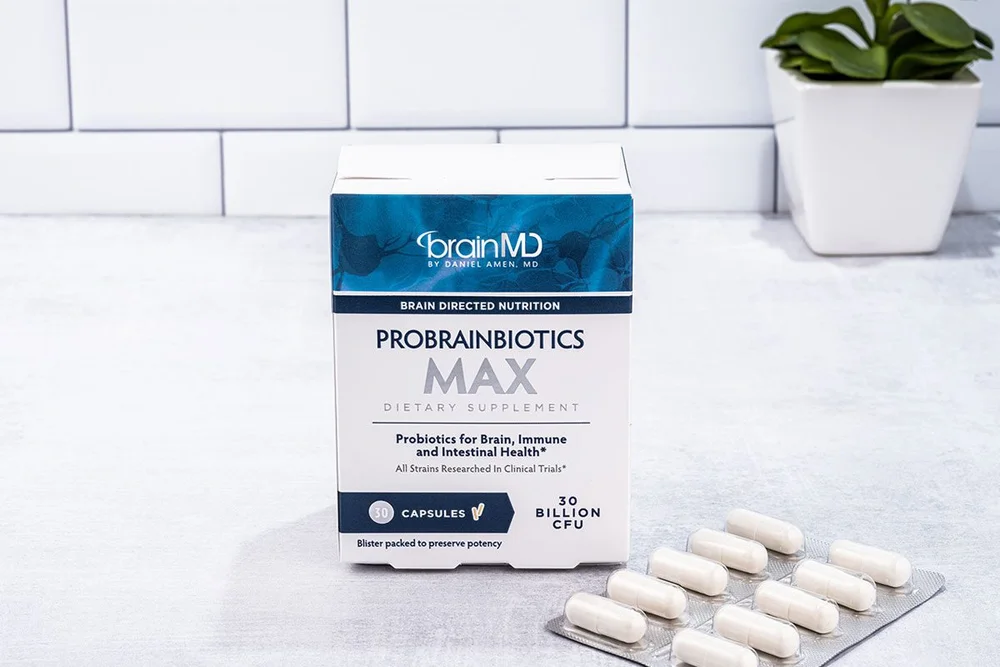ProBrainBiotics MAX Questions | What You Need to Know About Probiotics
Medically Reviewed by Dr. Parris Kidd
Dr. Parris M. Kidd, our Chief Science Officer and Director of Quality, has a PhD in cellular and developmental biology from the University of California at Berkeley and 38 years of expertise in dietary supplements and integrative medicine.
Today, we’re picking his brain on probiotics, getting the answers to your most pressing probiotic questions, and diving deep into the science behind our new broad-spectrum brain, immune, and gut probiotic supplement, ProBrainBiotics MAX.
Read the full interview below.
ProBrainBiotics MAX Questions
BrainMD: We know that our gut is intricately related to our health on many levels. We also know that most supplements require consistent daily intake for optimal results. Is this the case with probiotics, or can they be taken intermittently for occasional support and relief?
Dr. Parris Kidd: “Probiotic supplements aren’t likely to give immediate relief for intestinal problems. The live bacteria they supply have to settle in, reproduce and get to numbers that can become functionally significant in and amongst the trillions of other bacteria already in the gut. Probiotics are not drugs or even fast-acting nutrients. Think ecology – the human gut is a complex, intricate matrix of micro-ecosystems with bacteria as major players, and adjustments take time. It really takes well-designed clinical trials to inform us about the utility of any probiotic strain. In the case of BrainMD’s new broad-spectrum probiotic ProBrainBiotics MAX, the clinically documented benefits of the 7 strains – better brain, immune and gut health, better mood, better sleep, improved ability to cope with stress and anxiousness – are most likely to appear and expand over a period of weeks.”
BrainMD: Should you rotate your probiotic every 3-4 months for maximum benefit?
Kidd: “No. There’s no clinical evidence this is necessary or even helpful. With clinically-researched strains that are highly likely to improve overall microbiome functioning, as we’ve designed into this MAX product, the longer they’re consumed the better the results likely will be. Don’t believe everything you read on the internet.”
BrainMD: In the past, members of our team have shied away from taking probiotics due to adverse effects like bloating, gas, and intestinal discomfort after use. Will they be able to tolerate ProBrainBiotics MAX?
Kidd: “In my experience, the products most likely to have these undesired effects contain prebiotics – various forms of complex carbohydrates. It is not uncommon to experience gurgling or other intestinal discomfort after taking a probiotic + prebiotic product because the bacteria can go a bit crazy with all those carbs nearby. They can get very active and generate lots of gases, etc. ProBrainBiotics MAX doesn’t have that problem because it doesn’t contain prebiotics.”
BrainMD: Speaking of prebiotics, is there any clinical research supporting their benefit?
Kidd: “Yes. But many so-called prebiotics aren’t well researched in actual combination with probiotics. The prebiotic story is in theory pretty simple: good bacteria love to feed on fiber that the human gut cannot digest, and prebiotics are fibers of one type or another. The more fiber you consume, the better the environment for your probiotics. But prebiotics have to be very carefully chosen. Certain BMD products supply fiber that has proven prebiotic activity: the OMNI Protein products have 3 grams of fiber per serving, including 1 gram of inulin, which is an intensively researched prebiotic. Neuro Greens has 2 grams per serving of inulin and other prebiotic fiber, certified organic.”
BrainMD: What should you look for when choosing a probiotic supplement?
Kidd: “Clinical trial proof of benefit is so important for probiotic supplements. A probiotic strain can perform well in cultures, or in experimental animals, but the only way to know that it will consistently help people is to put it through clinical trials. As with any probiotic supplement – the good bacterial strains in PBB MAX face an uphill battle to produce health benefits. First, the tens of billions of good bacterial strains coming from our supplement each day are entering a gut milieu already populated by literally trillions of bad bacteria. Second, in the gut good bacteria are constantly being lost due to stress, toxins in foods, processed foods low in fiber and other nutrients, intake of alcohol or antibiotics or other drugs, and other negative factors. It’s a jungle down there – a micro-jungle, but jungle no less. This is why clinical trial proof of benefit is so important for probiotic supplements. Here are 4 things to look for:
- The Supplement Facts box must list them as strains, not just as species. For example, the species Lactobacillus helveticus has many different strains which have differing degrees of benefit. Lactobacillus helveticus strain Rosell®-52 has specific properties that make it beneficial, distinct from other strains of Lactobacillus helveticus.
- The strains that are used must have clinical research to support the benefits claimed for them. All 7 of the strains in BrainMD’s probiotic products have shown specific benefits in clinical trials.
- The bacterial counts (CFUs, Colony-Forming Units) must be sufficient to cover the counts that worked in clinical trials.
- The benefits claimed for a probiotic product must be based on scientific research, most preferably on the expert consensus of results from human clinical trials that are randomized, double-blinded and placebo-controlled.”
BrainMD: BrainMD has two clinically researched probiotic supplements ProBrainBiotics and ProBrainBiotics MAX. Can you explain the difference between them?
Kidd: “ProBrainBiotics is a powerful probiotic supplement and a pioneering brain product for its time. With two clinically validated bacterial strains (Lactobacillus helveticus Strain Rosell®-52 and Bifidobacterium longum Strain Rosell®-175), ProBrainBiotics delivers psychobiotic support for coping with everyday stress and can especially benefit those with mood issues. ProBrainBiotics MAX is the next generation of ProBrainBiotics. With seven clinically validated bacterial strains (including both strains found in ProBrainBiotics), the total amount of clinical research support for the brain, gut and immune benefits of ProBrainBiotics MAX exceeds any other probiotic on the market. It goes beyond the brain.”
BrainMD: What does the research say about the long-term use of probiotics? Should we do a course every 3 months, every day, once a year?
Kidd: “While working on this project I became convinced that as a form of “nutritional health insurance” it’s best to take a clinically verified probiotic supplement every day, along with a really good multiple vitamin-mineral and a clean, omega-3 concentrated fish oil.”
BrainMD: Is it also important to take digestive enzymes in addition to a probiotic?
Kidd: “Older people especially can benefit from digestive enzymes, and so can younger people who have damage to organs that make digestive enzymes, such as the pancreas. Plant enzymes are heavily promoted, but some of them are not potent enough to work well. Freeze-dried pancreas glandular preparations from pigs or sheep can be more potent digestive enzyme sources, given they are sourced from disease-free herds.”
BrainMD: Why do some probiotics require refrigeration while others do not? Does ProBrainBiotics MAX require refrigeration?
Kidd: “Probiotics are live bacteria, by definition. As time passes, some of them die. They’re also sensitive to exposure to air, as occurs when the bottle is opened. Refrigeration slows these damage processes but can’t stop them.
ProBrainBiotics MAX doesn’t require refrigeration – it contains extra bacterial cells to allow for loss over time when stored at room temperature. We also sealed the capsules individually in blister packs, to protect them from damage due to ongoing exposure to air.”
BrainMD: We loved your comprehensive explanation of the microbiome and what throws it off balance. (Tune in here if you missed it!) Can you expand on how toxins affect the microbiome?
Kidd: “Anything toxic getting into your mouth then getting swallowed can eventually come into close contact with your gut bacteria and damage or destroy some of them. Toxins entering the lungs can damage the delicate lung tissue and produce secondary toxins, which then enter the bloodstream and travel to the gut.
It’s very important to understand that every organ of the body is connected with every other organ (mainly by the circulation), so toxins generated anywhere in the body can travel to the gut and also hurt the microbiome.
Think of your body as having a TOTAL TOXIC LOAD. Even creams and other stuff applied to the skin can become absorbed into the blood vessels under the skin and increase the toxic load. For optimal health – of your microbiome, and the rest of your body – you’ll need to keep your total exposure to toxins to a bare minimum.”
BrainMD: Does antibacterial soap and hand sanitizer have adverse effects on the microbiome?
Kidd: “On the skin microbiome, probably yes. Many experts think antibacterial soap is not a good idea – they don’t work, and they typically contain toxic chemicals like triclosan.
Neither the soap nor the hand sanitizer should directly impact the gut microbiome. But it’s possible that if you applied a lot of the sanitizer to your skin multiple times during the course of each day, some of it could get absorbed into your skin circulation and find its way to your gut.”
BrainMD: Thank you, Dr. Kidd. We’ll stick to washing our hands with regular soap and water for 20 seconds as recommended by the CDC.
Is there a question we haven’t answered? Please share it in the comments! For more information regarding gut health and the intricacies of the gut microbiome, tune into our free 60-minute webinar here.
- Unlock The Secrets Of A Healthy Brain: 10 Takeaways From The Latest Genius Webinar With Dr. Amen - August 18, 2023
- Are Protein Bars Good For Your Brain & Body? We Asked A Nutrition Expert To Weigh In - November 4, 2022
- What’s Inside Vegan Omega-3 Power? Learn From Our Formulators About Pure Algae Omega-3s! - August 12, 2022




What is the best time of day to take probiotics? I have heard both in the morning and evening. As you can imagine, it leaves me wondering which is accurate.
Thank you for this excellent Q & A. I have Irritable Bowel Syndrome and I am very prone to diarrhea. In addition, I often have reflux and I am prone to gas and bloating. Will Probrainbiotics Max exacerbate any of my symptoms?Will it help with the diarrhea? Do you have any suggestions that may increase its effectiveness for me. I appreciate your help.